The world is on fire. At least, that’s how it feels to many Americans, as anxiety levels reach record highs. But whether you’re preparing to start your first undergraduate degree or considering a return for graduate school, research suggests that higher education can offer more than academic achievement. In anxious and uncertain times, college or university studies can provide purpose, community, and personal growth, powerful supports for both mental health and long-term career success.
The American Psychiatric Association says the things most likely to keep Americans up at night are geopolitical issues, public safety, money, and disease. Specifically, it reports that more than half of Americans feel very or somewhat anxious about: current events (67%), keeping themselves or their families safe (62%), paying bills (61%), their health (59%), identity theft (57%), and climate change (53%). Also significant are the impact of new technologies such as artificial intelligence, the opioid epidemic, and job security, which are significant stressors for 44%, 42%, and 40% of Americans, respectively.
There’s a time and place for everything, but if you’re one of the millions who’s feeling more stressed these days than usual, there’s at least one more balm worth trying that might temper your tension: education, the benefits of which could help you turn tough times today into triumphant times tomorrow.

Overcoming Mental Health Stress and Cost in Higher Education
Interest in higher education is near historic highs, according to research by Gallup and the Lumina Foundation, whose most recent “State of Higher Education” report shows that more than half (57%) of unenrolled adults have considered pursuing a degree or credential program in the past two years.
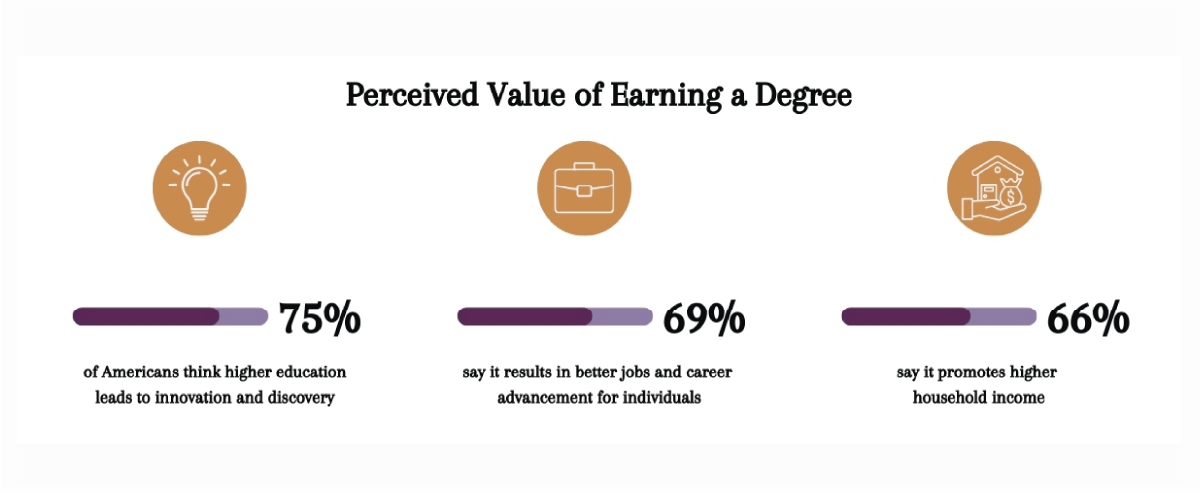
The perceived benefits of degrees are numerous. In a separate poll, for example, Gallup and Lumina found that approximately three-quarters of Americans think higher education leads to greater innovation and discovery, while 69% say it results in better jobs and career advancement for individuals. Another 66% say it promotes higher household incomes.
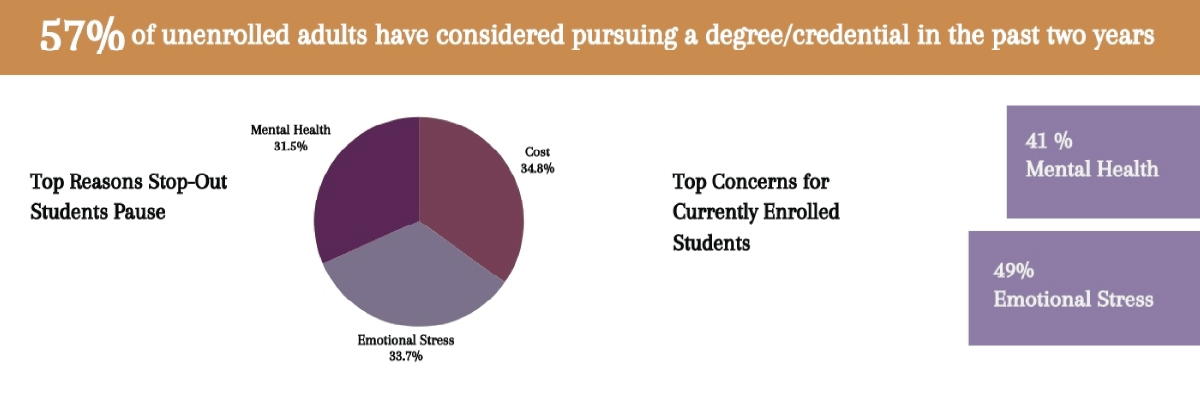
Yet many prospective students are opting out of undergraduate or postgraduate education instead of in. The sentiments of stop-out students (those who temporarily leave their education program with the intention of returning later) could help explain why. Although nearly one in three stop-out students (32%) say they’ve put their education on hold because of cost, almost as many say they’ve done so because of emotional stress (31%) or mental health concerns (29%), report Gallup and Lumina, which say mental health (41%) and emotional stress (49%) also are the top reasons that currently enrolled students give for having considered stopping out during the course of their studies.
That makes perfect sense to Elizabeth Schwab, Psy.D., founding chair of the M.A. Behavioral Economics program and professor at The Chicago School. “It’s scary to go back to school, especially if you’ve been out for a while, and doubly so if you have a full-time job and a family,” she says. “If you’re working and trying to take care of your spouse, your kids, your parents, or your grandkids, it may never feel like a good time to go back to school. For a lot of students in that position, it can feel quite foreign to prioritize themselves and their goals for the first time.”
Anxiety about world affairs, current events, and other external circumstances can compound the stress that people experience on a daily basis from work, family, and relationships, suggests Dr. Schwab, who acknowledges that education in particular may feel perilous right now.
“There are a lot of changes taking place right now related to the Department of Education and policies around things like student loans. The media is covering that, so it’s very top of mind,” Dr. Schwab explains. “When human beings see and hear things repeatedly, we can’t help but assume that there are widespread problems. If we’re seeing a lot of news stories about upheaval in higher education, for example, we might sense that everyone in higher education is anxious, and that we should feel anxious about higher education, too.”

How Graduate School Can Transform Your Career and Life
Whether due to personal stressors or political ones, it’s normal to feel anxious about the prospect of starting or returning to school. Before you dismiss the idea, however, it’s important to consider what education can offer.
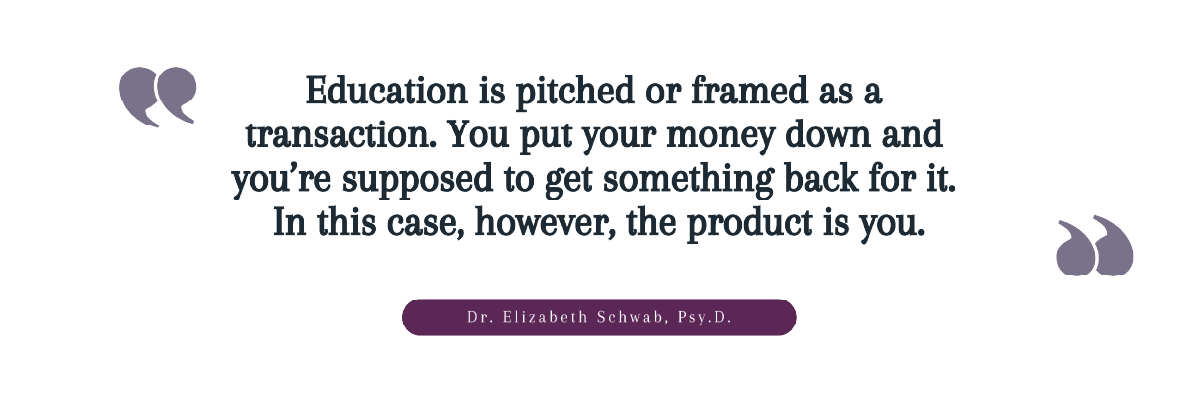
“It can really help to think about school as an opportunity for transformation,” Dr. Schwab says. “A lot of times, education is pitched or framed as a transaction. In other words: You put your money down and you’re supposed to get something back for it, like a product. In this case, however, the product is you. You’re undergoing a transformative process, which can be painful, but also exciting and joyful. So, part of going back to school is understanding that you’re embarking on a journey of self-identity. You’re evolving as a person and setting yourself up not only for better job outcomes, but also, hopefully, a better life experience.”
That better life experience is possible because you’ll presumably be pursuing an industry and career that you’re passionate about, which will unlock a new level of satisfaction that wouldn’t otherwise be possible.
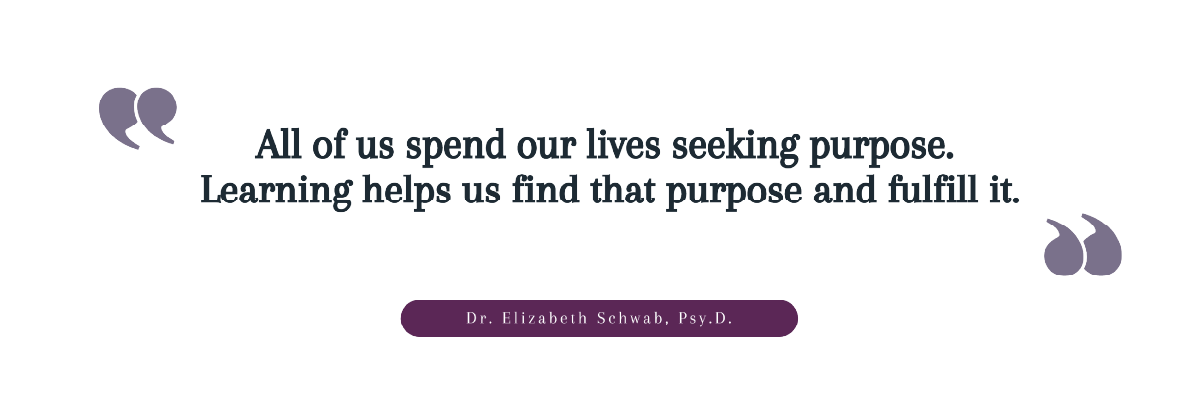
“Hopefully, you’re seeking a degree that will move you towards your life goals and bring you closer to a sense of fulfillment,” Dr. Schwab says. “That’s what education brings to the table. All of us spend our lives seeking purpose. Learning helps us find that purpose and fulfill it. That may or may not translate to making $1 million a year in your job. Instead, it might mean working at a nonprofit for lower pay—but with more passion and more bliss.”
Therein lies a powerful paradox: In times of heightened stress and anxiety, change can feel overwhelming. Yet it also can be the one thing that brings relief, if only you can find the will to push past your initial fear and discomfort.

Finding Mental Health Support and Community Resources for Students
The Chicago School offers mental health resources and support systems to help students succeed despite their anxiety or mental health challenges. For example, the school partners with mental health provider ComPsych to offer Student Solutions, a free, confidential, and 24/7 counseling service that helps students who are struggling with stress and anxiety, relationship issues, or legal and financial concerns.
The school’s most powerful support system, however, might be faculty and fellow students. “Most of the time you’re in classes with people who are admitted in the same cohort, so you’re seeing the same names and faces in your classes and you’re experiencing school together, which can be quite reassuring because you can begin to build relationships with others,” Dr. Schwab says. “And don’t forget your professors. They’ve completed a master’s degree, a dissertation, or a doctorate program, so they’ve been where you are and have a wealth of knowledge and experience and guidance to share.”
Especially helpful are applied research project (ARP) instructors and dissertation chairs. Plus, every student at The Chicago School also has a student support counselor who provides nonacademic assistance, including answers to general questions, connections to helpful resources, help with navigating institutional policies and processes, and a listening ear when students need someone to talk to.
“There will be lots of people around you here who want to see you succeed,” Dr. Schwab continues. “Our purpose at The Chicago School is shared, and our support systems are all aimed towards making sure that students feel comfortable, welcome, and empowered. We want you to get an education that you love and create a community that you really enjoy being a part of.”

Deciding When To Start School Amid Life Challenges
Timing is everything. If you’re not certain whether now is the right time to start or go back to school because of stress, mental health, or other circumstances, it might be helpful to seek counsel from others who have walked in the same shoes.
“It can be really helpful to speak with instructors, alums, or even current students to understand what their experience has been and how they coped with similar challenges,” Dr. Schwab says. “Reaching out and finding your people, so to speak, can really help with making a decision.”
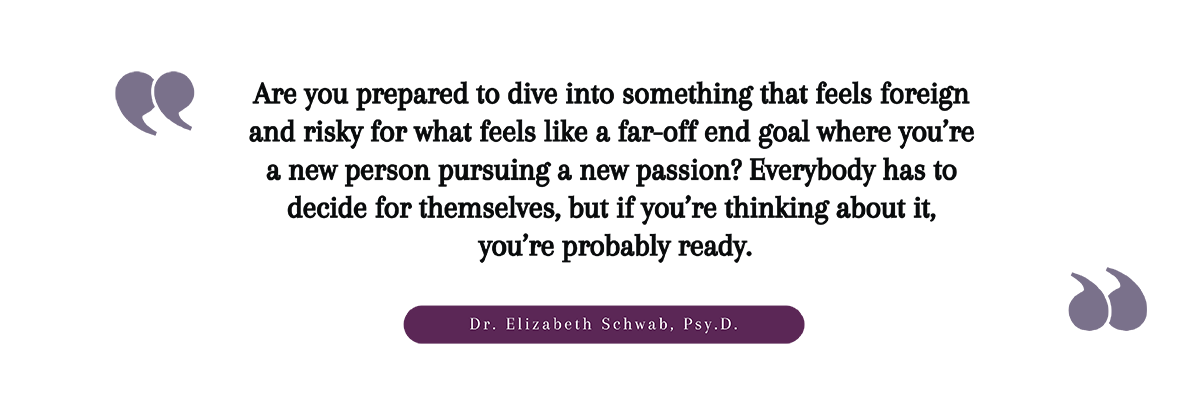
The final choice, however, must be yours. “Are you prepared to dive into something that feels foreign and risky for what feels like a far-off end goal where you’re a new person pursuing a new passion?” Dr. Schwab asks. “Everybody has to decide for themselves, but if you’re thinking about it, you’re probably ready.”
If you think you’re ready, then discover you aren’t, you can always press “pause” until you’re confident and comfortable enough to resume your journey.
“It’s normal to feel nervous or anxious about going back to school, and sometimes, life gives you challenges that might require you to step back from school, like parents passing away, pregnancies, or children getting sick,” Dr. Schwab says. “What I’ve noticed about students who are able to persist through these things is that they take breaks when they need to. We’re all human beings, and sometimes we need to take a breather. That’s OK. If you need to take a break, take a break. We’re not going anywhere. We’ll be here for you when you’re ready to return.”
Whatever life stage you’re in, starting an undergraduate program or returning for graduate school can be both daunting and deeply rewarding. Stress, uncertainty, and personal challenges are normal parts of the journey, but the support systems in higher education, from mental health resources to strong student communities, help you persist. When the time feels right, pursuing your degree can offer not only new career opportunities but also a renewed sense of purpose, connection, and resilience in the face of uncertain times.
Ready to take the next step toward your degree? Explore The Chicago School’s undergraduate and graduate programs today and discover how education can transform your future.

